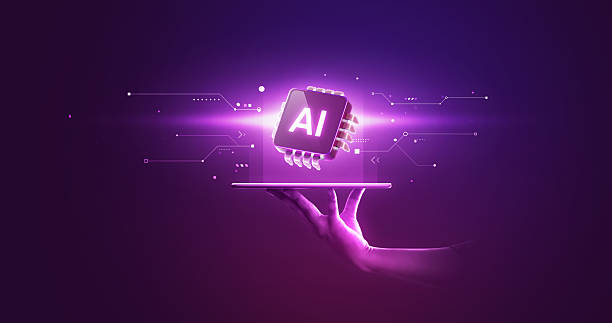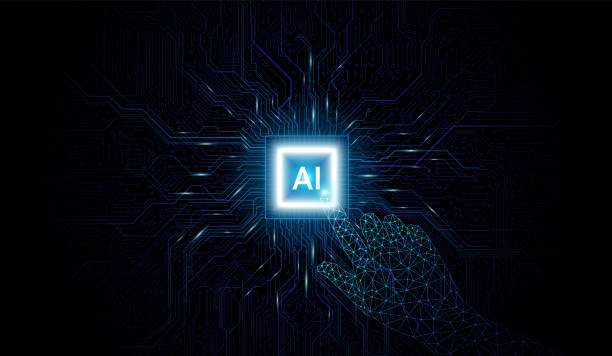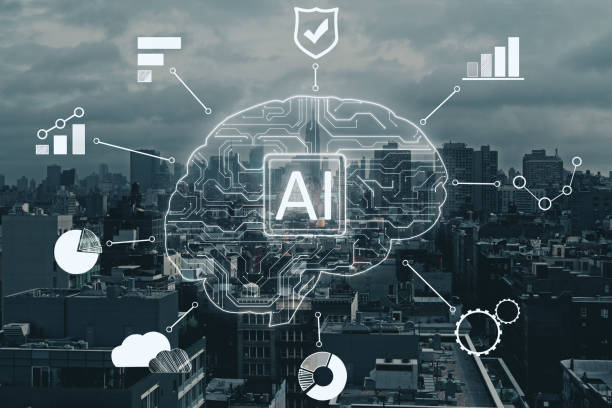What is Artificial Intelligence? A Comprehensive Definition and its Types
#ArtificialIntelligence (artificial intelligence) or AI, is a branch of computer science that deals with building machines that are capable of performing tasks that typically require human intelligence.
These tasks include learning, problem-solving, pattern recognition, natural language understanding, and decision-making.
In other words, artificial intelligence attempts to simulate human mental abilities in machines.
There are different types of artificial intelligence that are categorized based on their capabilities and applications.
Some of the most important types include:
- Narrow AI: This type of AI is designed to perform a specific task and specializes in that field.
Examples include facial recognition systems, spam filters, and recommendation engines. - General AI: This type of AI has the ability to perform any task that a human can perform.
It is not yet fully developed, but it is the goal of many researchers in this field to achieve it. - Super AI: This type of AI surpasses human intelligence and can solve more complex problems.
Its existence is currently hypothetical and the subject of much philosophical and scientific debate.
Narrow AI is currently very common and has many applications in various industries.
General and Super AI are still in the development stages, but they have the potential to create dramatic changes in the future.
Is your online store ready to attract the maximum number of customers and increase sales? Rasaweb transforms your online business with modern and efficient online store designs.
✅ Increased speed and improved SEO
✅ Excellent user experience on mobile and desktop⚡ Get a free consultation on online store design from Rasaweb!
The History of Artificial Intelligence: From Dream to Reality
The history of artificial intelligence dates back to the 1950s, when scientists and mathematicians such as Alan Turing and John McCarthy began exploring the possibility of building intelligent machines.
Turing presented the Turing test, a criterion for measuring the intelligence of machines.
In 1956, John McCarthy organized a conference in Dartmouth, which is recognized as the official starting point of artificial intelligence.
Click here to preview your posts with PRO themes ››
In the 1960s and 1970s, significant advances were made in areas such as natural language processing and expert systems.
Expert systems were computer programs that simulated the knowledge of human experts in a specific field.
However, this period also faced limitations, including a lack of computing power and sufficient data.
As a result, investment in this area decreased and a period known as the “AI winter” began.
In the 1980s and 1990s, with advances in hardware and software, artificial intelligence regained attention.
The emergence of machine learning algorithms and the increase in computer processing power made it possible to develop more complex systems.
In the 21st century, with the emergence of the Internet and the increase in the volume of data (Big Data), artificial intelligence has advanced rapidly and has been used in various fields such as image recognition, machine translation, and self-driving.
Applications of Artificial Intelligence in Everyday Life
Artificial intelligence plays an increasingly important role in our daily lives.
From voice assistants like Siri and Alexa to recommendation systems on Netflix and Amazon, artificial intelligence helps us get things done faster and easier.
Here are some of the important applications of artificial intelligence in everyday life:
- Voice Assistants: Voice assistants like Siri, Alexa, and Google Assistant use Natural Language Processing (NLP) to understand and respond to voice commands.
They can help us with tasks such as setting reminders, playing music, sending messages, and controlling smart devices. - Recommendation Systems: Recommendation systems on websites and applications such as Netflix, Amazon, and YouTube use machine learning algorithms to recommend content and products that may be of interest to us.
- Spam Filters: Spam filters use machine learning algorithms to detect and remove unwanted emails.
- Facial Recognition: Facial recognition is used in smartphones, social networks, and security systems to identify and authenticate individuals.
- Machine Translation: Machine translation uses machine learning algorithms to translate text and speech from one language to another.
- Self-Driving: Self-driving cars use artificial intelligence to understand their surroundings and drive without human intervention.
Click here to preview your posts with PRO themes ››
These are just a few examples of the applications of artificial intelligence in everyday life.
As technology advances, artificial intelligence is expected to play an even more important role in our lives.
| Application | Description |
|---|---|
| Voice Assistants | Understanding and responding to voice commands |
| Recommendation Systems | Recommending content and products of interest |
| Spam Filters | Detecting and removing unwanted emails |
Machine Learning and its Role in Artificial Intelligence
Machine Learning is one of the main sub-branches of artificial intelligence that allows machines to learn from data without explicit programming.
In other words, machines analyze data, discover patterns and hidden relationships, and make decisions based on them.
There are different types of machine learning algorithms that are categorized based on the type of data and the learning objective.
Some of the most important types include:
- Supervised Learning: In this type of learning, the machine is trained using labeled data.
This means that the data has specific inputs and outputs, and the machine tries to learn the relationship between them. - Unsupervised Learning: In this type of learning, the machine is trained using unlabeled data.
This means that the data only has inputs, and the machine tries to discover patterns and hidden structures in them. - Reinforcement Learning: In this type of learning, the machine tries to learn optimal behaviors by trial and error in a specific environment.
The machine is rewarded for each correct action and penalized for each incorrect action.
Machine learning plays a fundamental role in many applications of artificial intelligence, including image recognition, natural language processing, recommendation systems, and self-driving.
Do you dream of a thriving online store but don’t know where to start?
Rasaweb is your comprehensive online store design solution.
✅ Attractive and user-friendly design
✅ Increased sales and revenue⚡ Get a free consultation
Deep Neural Networks and the Artificial Intelligence Revolution
Deep Neural Networks are a type of artificial neural network that consists of multiple layers of neurons.
These layers allow machines to recognize more complex patterns in data.
In recent years, deep neural networks have achieved significant advances in areas such as image recognition, natural language processing, and machine translation, and are recognized as one of the main drivers of the artificial intelligence revolution.
Deep neural networks are trained using deep learning algorithms.
Deep learning allows machines to automatically extract important features from data and reduce the need for manual feature engineering.
Well-known architectures of deep neural networks include Convolutional Neural Networks for image recognition and Recurrent Neural Networks for natural language processing.
Deep neural networks are currently used in many applications of artificial intelligence and are expected to play an even more important role in the future.
Challenges and Limitations of Artificial Intelligence
Despite its impressive advances, artificial intelligence still faces challenges and limitations.
Some of the most important of these challenges include:
- Need for Large Amounts of Data: Machine learning algorithms require large amounts of data for training.
Collecting and labeling this data can be time-consuming and costly. - Explainability Problem: In many cases, the way machine learning algorithms make decisions is not clear.
This issue can be problematic in applications that require transparency and accountability. - Bias in Data: If the data used to train machine learning algorithms is biased, artificial intelligence systems may also act in a biased way.
- Ethical Issues: The use of artificial intelligence in areas such as self-driving and judicial systems raises important ethical issues.
- Security Threats: Artificial intelligence systems can be attacked and used for malicious purposes.
To overcome these challenges, more research is needed in areas such as learning with limited data, explainable AI, bias mitigation, and AI security.
Currently, many projects related to artificial intelligence are available as open source.
What Expectations Can Be Had for the Future of Artificial Intelligence?
The future of artificial intelligence looks very bright and promising.
With continued advances in areas such as machine learning, deep neural networks, and natural language processing, artificial intelligence is expected to play an even more important role in our lives in the coming years.
Some of the most important expectations from the future of artificial intelligence include:
- Expanding Applications: Artificial intelligence will find more applications in various fields such as healthcare, education, transportation, manufacturing, and customer service.
- Developing General Artificial Intelligence: Achieving general artificial intelligence that is capable of performing any task that a human can perform is the goal of many researchers in this field.
- Increasing Automation: Artificial intelligence will help automate many tasks and increase efficiency and reduce costs.
- Creating New Jobs: While artificial intelligence may lead to the loss of some jobs, it will also create new job opportunities.
- Social Changes: Artificial intelligence can create profound changes in society and change the way we live, work, and interact with each other.
| Field | Artificial Intelligence Application |
|---|---|
| Healthcare | Disease diagnosis, drug development, patient care |
| Education | Personalized education, automated assessment, educational assistants |
| Transportation | Self-driving cars, traffic management, route optimization |
Job Opportunities Related to Artificial Intelligence
With the increasing growth of artificial intelligence, many job opportunities have been created in this field.
Some of the most important of these job opportunities include:
- Data Scientist: Data scientists are responsible for collecting, analyzing, and analyzing data and extracting valuable information from them.
- Machine Learning Engineer: Machine learning engineers are responsible for designing, developing, and deploying machine learning algorithms.
- AI Engineer: AI engineers are responsible for developing and implementing artificial intelligence systems.
- AI Researcher: AI researchers are responsible for conducting research in various areas of artificial intelligence and developing new algorithms.
- AI Analyst: AI analysts are responsible for evaluating and analyzing the performance of artificial intelligence systems.
To enter these jobs, it is necessary to have knowledge and skills in areas such as computer science, mathematics, statistics, machine learning, and programming.
Also, having experience working with tools and technologies related to artificial intelligence can be very useful.
Do you know that your company’s website is the first point of contact for 75% of potential customers?
Your website is the face of your brand. With Rasaweb’s corporate website design services, create an online presence that builds customer trust.
✅ Create a professional and lasting image of your brand
✅ Attract target customers and increase online credibility
⚡ Get a free consultation from Rasaweb experts!
How to Learn Artificial Intelligence: Resources and Guidance
Learning artificial intelligence can be a big challenge, but with the right resources and a regular program, you can make progress in this area.
Here are some useful resources and guidance for learning artificial intelligence:
- Online Courses: Many online courses are offered on websites such as Coursera, edX, and Udacity that cover various topics of artificial intelligence.
- Books: There are many books on artificial intelligence and machine learning that can help you understand the basic concepts.
- Online Resources: There are many websites and blogs about artificial intelligence and machine learning that can provide you with useful information.
- Practical Projects: Doing practical projects can help you learn and practice artificial intelligence skills.
- Artificial Intelligence Community: Participating in conferences, workshops, and events related to artificial intelligence can help you connect with other experts and learn from them.
To get started, you can start by learning the basic concepts of computer science, mathematics, and statistics.
Then, you can learn about machine learning and deep neural networks.
Finally, you can strengthen your skills by doing practical projects.
Artificial Intelligence and Ethics: Important Considerations
The use of artificial intelligence raises important ethical issues that must be addressed.
Some of the most important of these ethical considerations include:
- Privacy: Artificial intelligence systems often need to collect and process large amounts of personal data.
Maintaining the privacy of individuals in this process is very important. - Bias: If the data used to train machine learning algorithms is biased, artificial intelligence systems may also act in a biased way.
- Transparency: The way artificial intelligence systems make decisions should be transparent and understandable.
- Accountability: In the event of an error or problem in artificial intelligence systems, responsibility must be determined.
- Security: Artificial intelligence systems must be protected against cyberattacks and potential abuses.
To address these ethical issues, there is a need to develop appropriate laws and regulations, create ethical standards, and provide public education about artificial intelligence.
Also, it is necessary for artificial intelligence experts to pay attention to these issues and consider ethical considerations in the design and development of artificial intelligence systems.
Frequently Asked Questions
| Question | Answer |
|---|---|
| 1. What is Artificial Intelligence (AI)? | It is a branch of computer science that aims to create machines capable of simulating human intelligence and performing tasks that require human thinking, such as learning, problem-solving, and decision-making. |
| 2. What are the main types of artificial intelligence? | It can be classified into Narrow AI (which focuses on a specific task), General AI (which has comprehensive human capabilities), and Super AI (which surpasses human intelligence). |
| 3. Mention some common artificial intelligence applications in our daily lives. | These include voice assistants (such as Siri and Alexa), recommendation systems (such as Netflix and Amazon), self-driving cars, facial recognition systems, and spam filters. |
| 4. What is the difference between Artificial Intelligence and Machine Learning (Machine Learning)? | Artificial intelligence is the broader concept of creating intelligent machines, while machine learning is a subset of artificial intelligence that focuses on enabling systems to learn from data without explicit programming. |
| 5. What is Deep Learning? | It is a subset of machine learning that uses multi-layered artificial neural networks (deep neural networks) to process data and discover complex patterns, and is used in image and speech recognition. |
| 6. What are the most prominent benefits of artificial intelligence? | Improving efficiency and productivity, automating repetitive tasks, making better decisions based on big data analysis, and developing solutions to complex problems in fields such as medicine and science. |
| 7. What are the main challenges facing the development and deployment of artificial intelligence? | These include the need for huge amounts of high-quality data, privacy and security issues, bias in data and algorithms, and high development and maintenance costs. |
| 8. Does artificial intelligence raise ethical or social concerns? | Yes, it raises concerns about privacy, algorithmic bias, job loss due to automation, and responsibility for errors made by intelligent systems, and the need for a regulatory framework. |
| 9. How can artificial intelligence affect the future of the labor market? | It can lead to the automation of some routine tasks, but it will also create new jobs that require advanced skills in developing, operating and maintaining artificial intelligence systems. |
| 10. What are some modern or promising technologies in the field of artificial intelligence? | These include advanced Natural Language Processing (NLP) (such as large language models such as ChatGPT), computer vision, robotics, and Generative AI. |
And other services of Rasa Web Advertising Agency in the field of advertising
Intelligent direct marketing: An innovative service to increase the click-through rate through attractive user interface design.
Intelligent sales automation: An innovative service to increase site visits through marketing automation.
Intelligent Google Ads: An innovative service to increase site visits through customization of the user experience.
Intelligent customer journey map: A creative platform to improve customer behavior analysis with a SEO-driven content strategy.
Intelligent UI/UX: An effective tool to increase site visits with the help of marketing automation.
And more than a hundred other services in the field of internet advertising, advertising consulting and organizational solutions
Internet Advertising | Advertising Strategy | Advertorial Report
Resources
What is Artificial Intelligence? Everything about Artificial Intelligence
,What is Artificial Intelligence? – Applications, Benefits, Disadvantages, Types and History of Artificial Intelligence
,What is Artificial Intelligence? – Applications, Types, Advantages and Disadvantages of Artificial Intelligence – Tech Rato
,Introduction to Artificial Intelligence – Faradars
Are you looking for a big leap in your online business? ? Rasaweb Digital Marketing Agency offers specialized services including WordPress website design, SEO and digital advertising, intelligent solutions to grow and be seen in the online space. With us, the digital future of your business is brighter.
📍 Tehran, Mirdamad Street, next to the Central Bank, South Kazerun Alley, Ramin Alley No. 6














